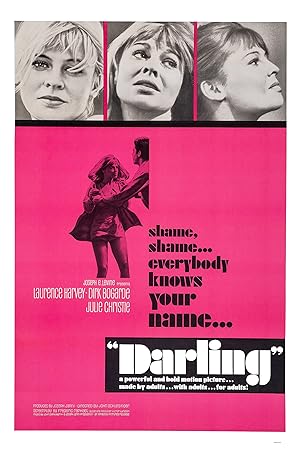Darling is a black and white seventy-eight minute film about a young woman who is house sitting at a historically dubious home in Manhattan. The movie is divided into six chapters. The central question seems to be whether or not she was always mad or if something supernatural lurks behind the stately home’s pleasing façade. Stay for the closing credits for a solid answer.
I was lured into watching this movie from an effective trailer on a DVD. Do yourself a favor: skip Darling and watch Hereditary. I can’t suspend disbelief for long if a grown woman is dressed up like a little girl and has crazy eyes from the beginning. I need a few more establishing shots of the main character before you throw her in an unfamiliar environment for me to believe that she is possessed from contact with an upside down cross. How do I know that she isn’t just the unborn love child of Glenn Close and Michael Douglas from Fatal Attraction? She looked like an adult live action Edward Gorey character.
The following may be cliché, but it is accurate. Darling is more style than substance as it evokes films from the 1960s and 1970s. The visuals are so much better and riveting than the actual story. I was seduced by the depiction of the city, and the film is heavily atmospheric and oneiric, but sometimes showing and not telling does not work when you never show what we want to see. We rarely see the shark in Jaws or catch more than a glimpse of the monster because it ruins what frightens us by making it clear, but those reveals are practically gynecological in comparison to what we see in this film, which is nothing but a reaction shot from the main character when she finally glimpses the forbidden. Bluebeard’s wife exclaims that cop out, thy name is Darling!
I kept falling asleep throughout Darling. Was I actually tired or bored? Is it an ancient evil? Did a vengeful spirit of a wronged woman possess her? I just wanted the movie to end. I didn’t care. She is openly hostile and ready to jump bad at the slightest comment so other than being a typical dude not expecting to be in danger, I thought one of the characters was moronic in extending his interaction with her for longer than a few minutes. I’m supposed to be shocked at what follows, but it seemed obvious to me. I was more taken aback by how she wields paper towels. Also did she ever retrieve the bag of groceries that she accidentally dropped? This is my primary concern. Don’t let the warning at the beginning of the film deceive you into believing that this movie will be disturbing. It wasn’t.
Darling succeeds at making me sad that we didn’t get more Sean Young in this film or Blade Runner 2049. Imagine if we got the real deal instead of the simulacrum of her younger self! Her bookend appearances and vocals were the high points of the film and made the film more nuanced than it deserved. Even though Lauren Ashley Carter did a great job, if Helen Rogers, who appears in the post credits scene, and Carter switched places, I would have been able to empathize with the main character more instead of immediately being suspicious. Also I’m from NYC. Rent is expensive. You could literally, God forbid, witness a murder, and if you were offered rent free housing at the site of the murder, most people would take it and celebrate. People literally read obituaries to find available listings before they hit the market, which is the only reason that I cut the main character any slack because her boss had to be lying about how hard it was to find someone to fill the position. Also who checks references after handing over the keys to your home? (Oh wait, I have. Oops.) Larry Fessenden has a brief cameo that isn’t worth the price of admission if you are a fan. I only wanted to know more about Al-Nisa Petty and her relationship to the boss and the house. Why wasn’t she housesitting? Is she in on it or genuinely shocked and trying to prevent the inevitable? Finally a movie in which the black person does not die first!
I don’t mind it when films do not clearly indicate the time period that the movie is set in. Films such as It Follows does so successfully, but Darling is aggressively retro in its costumes and décor then it obliterates that sensibility in the last scene. The last character introduced to the viewers seems as if she has a contemporary manner. The main character and her boss just happen to share the same personal style aesthetic. If it was a way of contrasting other characters or reflecting vulnerability to supernatural forces, I would be fine, but it is a choice that does not seem to have a deeper meaning other than it makes the movie more visually appealing and evocative without actually serving a function.
Darling is an experimental film with a premise that has mainstream appeal. I enjoy artsy fartsy flicks, but I’d rather watch a Roman Polanski film than one that pays homage to him. Seventy-eight minutes felt like an eternity. I guess that I’m a Philistine because this movie did nothing for me.
Stay In The Know
Join my mailing list to get updates about recent reviews, upcoming speaking engagements, and film news.





